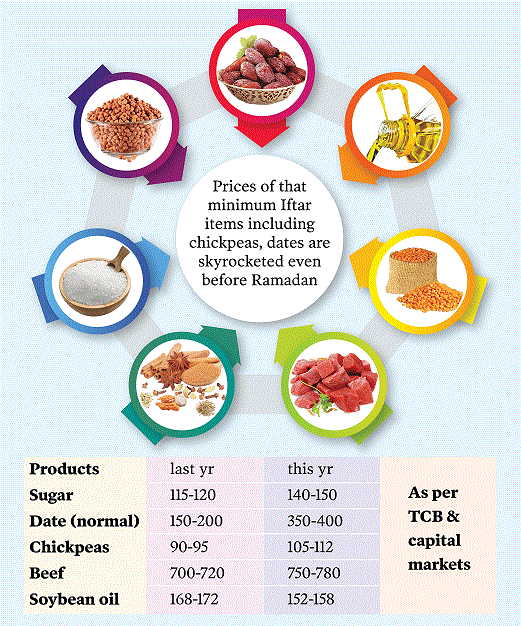Staff Reporter
As there is only two or three days left for the Ramadan month, the buyers are busy buying commodities needed for fasting. But like the previous years, traders are taking the privilege after rising essential commodities which lead sufferings for the consumers.
During Ramadan, people usually break their fast with at least two dates and a glass of juice in Iftar. However, the price of that minimum Iftar items are skyrocketed even before the Ramadan comes. The price of dates, lemons, sugar has gone up.
According to the Bangladesh Trade and Tariff Commission, the demand for dates in the country is one lakh tons annually. In Ramadan alone, 50,000 tons are needed. Traders also increased the price due to high demand during Ramadan. But this time, high tariffs are part of the traders' efforts. Fruit importers claim that even after a 10 percent reduction, they still have to pay duty of Tk 150 per kg of ordinary dates.
At present, the price of one kg of ordinary quality (Zaidi) dates in the market is Tk 350 to 400. Last year, the price of eggplant, which was Tk 150 to 200 per kg, was Tk 150 to 200. As a result, the buyer has to spend an additional Tk 200 to buy every kg of dates. Not only dates, but all fruits are expensive.
About 200,000 tons of chickpeas are imported annually. It takes 100,000 tons to fast. Last year, the price of chickpeas, which was sold at Tk 80 to 100 per kg, were sold between Tk 40 to 60. Now it is being sold at Tk 105 to 112. As a result, it will cost more than Tk 15 to 17 per kg. Last year, the price of chickpeas, which was sold at Tk 80 to 100 per kg, were sold between Tk 40 to 60. Now it is being sold at Tk 80 to 82.
On the other hand, broiler and Sonali chicken are showing the price. Beef increased by at least Tk 100 per kg. The price of all fish is also increasing. Not just dates, sugar, lemons, fish and meat; the prices of most commodities are unstoppable. Five or six days before the start of Ramadan, such a rise in commodity prices says that this time Ramadan will be more expensive.
Although vegetable prices were a little low even a week ago, now the prices of vegetables used in iftar are on the rise. Meanwhile, one and two-litre bottles of newly priced soybean oil is yet to reach the market. As a result, consumers have to buy soybean oil at a price higher than the fixed rate.
Besides, the price of sugar has increased by around Tk 2 at wholesale and by Tk 5 at retail. The price of sugar rose to Tk 145 to 150 per kg at the retail market, after the fire at a sugar warehouse in Chattogram. However, the concerned said that it won’t create any massive shortage of sugar in the market.
Rafiq Alam of Rafiq Store in capital, said price of sugar has increased a little at wholesale. But there is little chance of further rise in the price as there is no crisis in the supply at the moment.
Meanwhile, the prices of different varieties of lentils are on the rise. The price of good quality chickpeas has increased by Tk 2 to 5 per kg. And the prices of anchor daal (lentils) and grass pea have increased by around Tk 5 per kg. Per kg anchor daal was being sold at Tk 80 to 85 and per kg grass peas at Tk 115 to 125 depending on the quality.
Tisha Akhter, a resident of New Market, said the price of beef has been on the rise over the last month. Therefore, people were leaning towards chickens. However, the rise in the prices of chicken right before the Ramadan will increase their expenses in another phase. She demanded strict actions to control the markets.
In the meantime, the five-litre bottles of newly priced soybean oil have arrived in the markets. However, the one and two-litre bottles of newly priced soybean oil are still unavailable. Taking advantage of this, some sellers are selling soybean oil at a price higher than the price set by the government.
However, the government on February 8 exempted import duties on dates, sugar, soybean oil and rice to rein in the prices of commodities during Ramadan. However, the prices of other three products except soybean oil have not decreased slightly, rather they have increased. Not everyone is benefiting from soybean oil. Although new low-priced soybean oil is supposed to be supplied to the market from March 1, most shops are still selling old-priced oil. In some shops, a low-cost five-liter bottle is available, but one or two-liter bottles are not available.
There have been no major changes in the prices of rice and flour. But the price of dates is quite high this time as compared to the past years. Besides, the prices of different types of fish, beef and mutton remained almost the same as the past week. Meanwhile, the onion prices have come down a little after the decision to import onion was taken. The price of onion has come down to around Tk 100 from Tk 120.
CPD Research Director Dr Golam Moazzem said inflation eased slightly in February but remained above 9 percent. This is not very normal.
According to him, there is some flaw in the market management. As a result, the benefits of reducing tariffs are not visible. The reason for this is that the number of companies supplying products in the market, that is, competitors are less. Few importers control the market. The market runs at the price they set. On the other hand, the government is also a little worried about the lack of importing companies. Because the government thinks that if the importers are pressurized, they will have a negative impact if they stop importing. So the importer has to be increased.
Ghulam Rahman, president of the Consumers Association of Bangladesh (CAB), said the government has taken some positive steps, including reducing the tariff. But as the saying goes, one drop of time, ten drops of time. Positive action was not taken in a timely manner. If taken on time, the consumer would now get the benefit.






